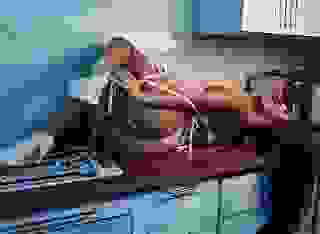Note: You can change font size, font face, and turn on dark mode by clicking the "A" icon tab in the Story Info Box.
You can temporarily switch back to a Classic Literotica® experience during our ongoing public Beta testing. Please consider leaving feedback on issues you experience or suggest improvements.
Click here"And just because they thought you were gay."
"I am gay, Mason. They weren't wrong about that. They were just vicious, moronic bigots, but they weren't wrong about that. I didn't try to pick one of them up or anything. I was minding my own business. They just wanted a faggot to pound."
"Since when are you gay? Nick the ladies' man of the Lower Mall residences?"
"Since day one, Mason. The ladies were just friends. I was popular with them because I was non-threatening and listened to their boyfriend troubles. I had no designs on them sexually."
"Nick I'm amazed. Why didn't you tell me this earlier?"
"What for? It's not something I talk about."
"But maybe you should. Maybe it has a lot to do with your depression."
"It does. Sure it does. Repression isn't easy, as I'm sure you know."
"What?"
"The question is, now that I've told you, how do you feel about it? How do you feel about living with a gay male?"
"Well I haven't exactly had much time to think about it. But I don't imagine it's going to make any difference at all, is it? It's not like you're going to jump me any time soon, are you?"
"You're not my type, Mason. You can relax."
"I mean I may have my hang-ups, but I'd like to think bigotry isn't one of them. And what's this about repression? You think I'm repressed?"
Nick laughed out loud. It was the first time all summer I'd so much as seen him crack a smile.
And it wasn't repeated. Neither one of us referred to this conversation in the next week or two and one day I found a note on the kitchen table, along with Nick's half of the following month's rent. He was moving back to his mother's house in the Fraser Valley for the rest of the summer, then he was off to graduate school on the prairies. He hoped this wasn't too much of an inconvenience, but he needed to get out of the city for a while.
I rattled around the gloomy apartment for a week or two and then moved into a bright, ninth floor studio in a high-rise building that boasted an indoor swimming pool. It was my first real apartment all to myself, and I was ready for it. After weeks of grim incarceration with Nick, it felt like a step in the right direction at last.
To pay for the place I had to make another daring post-graduate career move and so I reluctantly quit my dish-slopping gig, took out a chauffeur's permit, and applied for a job driving taxi. My beard and longish hair disqualified me from the larger companies in town and I wound up at the seven-car fleet owned by Joe Falcone, whose dispatch office and headquarters were downstairs from his main business, the Playroom Nightclub.
My first real job interview Joe conducted himself one quiet Sunday afternoon in the deserted, red-walled club, and after checking the chauffeur's permit he had me drive him around the block in one of his off-duty cabs. I'd driven nothing but a beat-up VW in need of a brake job for the past few years, and when I applied the taxi's disc brakes I nearly put Joe through the windshield. But the interview was a success.
"What shift you want?" Joe asked, his porkpie hat slightly askew.
"Anything but dayshift," I replied.
And so the next night I found myself on the one a.m. to ten a.m. shift, the first of a six day week, driving nattily dressed businessmen to their hotels with call-girls working out of Joe's Playroom. The money was lousy, the benefits non-existent, but I didn't have to work days, there was no boss squinting over my shoulder, and there was no public speaking involved. I also had lots of time to read between trips.
I had my own apartment, a job that paid the rent, with enough left over for books and records and girlie magazines. I had an indoor pool for exercise and a sauna for relaxation right on the premises. For a while I was almost happy, though of course the same major element was always missing.
In my off hours I prowled the local library and pored over city directories, wondering whatever happened to a certain Kirsten with a Nordic surname of West Vancouver. She made one appearance in the previous year's phone book, with an address in a West Van. apartment building two blocks from the beach. There was a listing in last year's city directory giving her occupation as elementary school teacher. Then she disappeared. Either she had left town or, more likely, gotten married and taken her husband's name. I would never see her listed again.
And my investigation was brief, during a day or so of more than usually intense loneliness. I recognized my behavior as pointless and not a little neurotic. I had to build a life without Kirsten. I was well into my twenties now, with nary a girlfriend to my name.
In an attempt to use my education for something I took my next wayward step by trying to write serious fiction, whenever I could come up with a scrap of an idea. But it wasn't easy. I tried elaborating some of my experiences in Europe, and sent them off neatly typed. I began to accumulate rejection slips at a regular rate.
I wrote about the characters I drove around in my cab all night long: the sexy hookers working out of Joe's nightclub and their business-suited johns whom I chauffeured to some of the city's best hotels, and the not so sexy street girls and their hangers-on, the druggies and transients and sleazy characters of the town's night-life. The rejection slips continued.
Even the piece I had most hope for was returned. This concerned the only one of the professional girls from Joe's Playroom I found interesting, a soft-spoken, intelligent young woman who seemed way too sensitive to be working as a hooker. Slender and petite, with reddish hair and glasses, she was a university student who only worked weekends in Joe's establishment. I drove her home several times at three or four in the morning, out to within a block or so of the university gates. She always asked me to drop her on a corner in the suburban neighborhood, so that I would never learn where she lived, but we had one or two pleasant conversations on the long drive and she once asked me if I had anything to read in the car. I lent her the first volume of Durrell's "Alexandria Quartet," and the next time I saw her she thanked me profusely, telling me she couldn't stop reading it and had already gone out and bought the other three volumes. I had high hopes of discussing them with her but soon the Spring term was over and I never saw her again.
The piece I wrote speculated on her past and why she worked part-time at such a strange, potentially dangerous profession. But driving her less sensitive co-workers around town half the night was actually starting to get to me, and after six or eight months, when I could take no more of the city's underbelly and a schedule that forced me to drive through morning rush hour after being up all night, I quit Joe's taxis and drew unemployment benefits for a while.
The last straw was being plowed broadside in an intersection one Sunday morning by a doped-up loser in a panel van, coming to rest with a telephone pole embedded in the rear door of the cab, inches from where I sat. I walked away from that without a scratch but didn't want to tempt fate further.
For my next career move I found part-time work in a giant food warehouse, loading and unloading trailers with a forklift on the busy afternoon shift. The job also involved lots of lifting and by the end of my five hours I was limp with exhaustion.
It also forced me into contact with real people in a real world, and not creatures of the night or the streets. There was Jan the Czech medical school dropout and alcoholic, and Reed the hipster who boasted he had forgotten more about illicit drugs than most people would ever know.
There was Uncle Billy, as he was known, the sixty three year old receiver/dispatcher who asserted on my first day that he'd never been out with a woman and spent the next few months detailing his exploits with various and sundry young men in the Hastings Street steam-baths. All in all a better class of deviant and pervert than I'd been wont to meet on the night-shift taxi detail.
And then there was a heavy-set single mother with the unlikely name of Connie Fountain who delivered to the warehouse in a fifty-eight foot tractor trailer three times a week. She was possibly the least physically attractive woman I had ever encountered. She seemed put together from two separate bodies: above the waist slender, narrow-shouldered, small-breasted, and below huge in the hips and thighs and rear, her legs short and stumpy.
I made a friend of her, and of Uncle Billy, Jan and Reed. I began to join this motley crew in a local bar after shift on a regular basis. I could sleep late in the mornings and still have time for some tennis and a little writing. Though as weeks passed I spent less and less time at the typewriter.
It occurred to me that I was aiming too high. Shipping off self-conscious attempts at fiction to glossy magazines was a recipe for frustration and failure. If I was to continue writing at all, I would have to lower my sights considerably. I decided to forget about fiction. What did I really know about prostitution and drug addiction and street life except what I saw from the sidelines? What did I really care about any of these things? The self-absorption of the life styles of the night was hermetic. I couldn't pretend to know it from the inside, and in all truth I just wasn't that interested.
I would write about something I knew thoroughly and submit the stuff locally, within the city. For some time I'd been reading record reviews in a local alternative tabloid called the Western Signal, and I knew I could produce critiques as good if not better. I wrote reviews of two albums I'd enjoyed recently and submitted them in my usual immaculate typescript. I heard nothing for five or six days but then received a phone call from the entertainment editor inviting me to drop by the office for a chat.
It was my first positive response from a faceless editor, and in less than a week rather than the usual two to three months. It was a huge boost for my fragile confidence.
Al Bloomer was the editor's name, and he said the reviews would be published in the paper's next issue.
"They're better than anything I could write, that's for sure," he said. "On your way out look through the bin of review copies and take whatever strikes your fancy. We'll publish whatever you submit. The catch is we don't pay a nickel for record reviews. You just get to keep the LP or trade it in. But we can find you other stuff to do that we may pay you a pittance for, even the occasional concert review, though Templeton already has the best of those sewn up. You have any objections to working for peanuts, or for free, just to see your name in print?"
I had none. I was in heaven. And the following Thursday was one of the more exhilarating days of my life as I rushed out to buy my copy of the Signal, to read my reviews, without a single word changed or omitted, and my name in print beneath.
And so after my evening shift at the warehouse, if I wasn't meeting Connie and Jan or Reed and Uncle Billy in the bar, I would go for a run and then a swim, either at the university or in my building's pool, and after a light meal I was ready, by about one in the morning, to start work on my reviews.
I would lie on my bed wearing head-phones and construct careful miniature critiques, mostly of music I'd bought myself and loved, but often of music I'd picked up at the paper and loathed. I was exposed to much that I'd never heard before and my record collection grew so extensive I had trouble storing it in my tiny studio. I was never much interested in reviewing mainstream stuff. No Elton John for me. I'd root out the obscure, and later the alternative material. Stackridge, Per Ubu, and later the Ramones, XTC.
I was given the odd concert to review, usually second-string gigs that Rick Templeton, the reviewer who'd been at the paper longest, did not deign to cover. But once in a great while I did get to work a major one, and could sit in the press box at the Pacific Coliseum, say, along with the rock writers from the city's two big daily papers.
I even got to conduct an occasional telephone or in-person interview with lesser known musicians and, miracle of miracles, I overcame my initial nervousness enough to do a decent job. I was almost articulate!
It was a period of great contentment. I had a job that was physically exhausting and that paid my expenses, yet didn't take up too much of my time. I was writing about what I knew best and what was dearest to my heart. I was being published. I had a bright studio apartment all to myself. I felt as though maybe I'd started taking a step or two in the right direction at last.
So why couldn't I be content with that? Why couldn't I settle down in my studio and work and write and exercise and read my sex magazines and live my life simply, straightforwardly, and alone? Why was it that at the end of a long and productive and exhausting day I would sometimes stand at my window and gaze at the lights of the west end like a lovelorn schoolboy? And why was I about to take yet another of the greatest false steps of my life?
- COMMENTS








